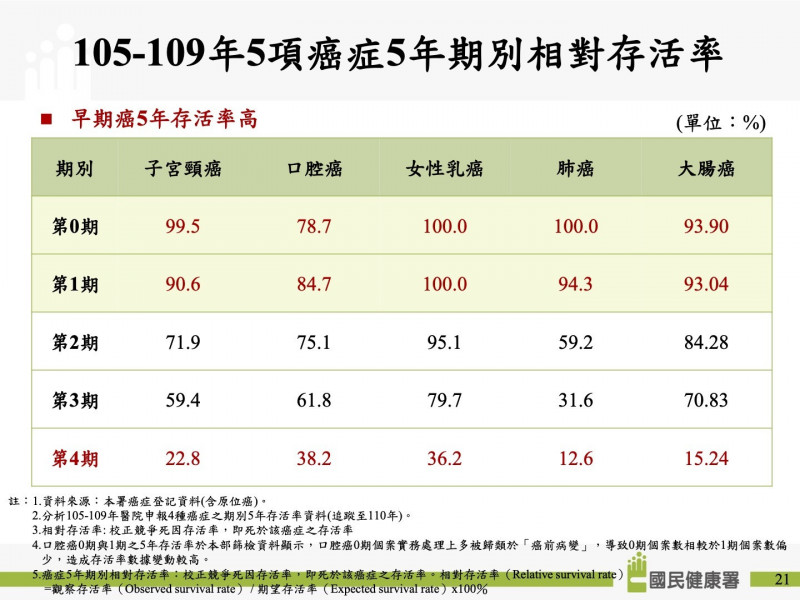The National Health Service released the latest 2020 cancer registration report today. Through early screening, it is expected to eliminate 100% of cancer cells.
(courtesy of the National Health Service)
[Reporter Qiu Zhirou/Taipei Report] People in the country turn pale when they hear about cancer. The National Health Service released the latest cancer registration report in 2020. One person is diagnosed with cancer every 4 minutes and 19 seconds. However, cancer is no longer a terminal illness. The five cancers provided by the government Screening, early detection, and even 100% elimination of blocking cancer cells.
The National Health Administration tracks 5 cancers including "cervical cancer, oral cancer, female breast cancer, lung cancer, and colorectal cancer". The relative survival rate of the 5-year period from 2016 to 2020, the 0-1 survival rate is more than 90% Among them, the survival rate of female breast cancer stage 0-1 and lung cancer stage 0 is 100%.
Please read on...
Once it is discovered later, the survival rate will drop sharply. In the case of lung cancer, the 5-year survival rate of the second stage drops to 59.2%, and the remaining 12.6% in the fourth stage.
However, in the second stage of cervical cancer, oral cancer, female breast cancer, and colorectal cancer, the survival rate is still more than 70% to 95%, and in the fourth stage, the survival rate drops to less than 38%.
Wu Zhaojun, director of the National Health Administration, said that screening can effectively reduce cancer mortality. In previous years, the annual screening for cancer was about 5 million person-times. After the outbreak of COVID-19, the number of screenings decreased greatly. 16 to 17%. In 2021, it will decrease by 16% compared to 2020. In 2022, the total number of cancer screenings will be about 4.35 million. Take advantage of the enemy's opportunity.
The qualifications for the five cancer screening services subsidized by the National Health Administration are as follows:
●
Oral cancer
: Oral mucosal examination is provided for people over 30 years old who have chewed betel nut (including those who have quit betel nut) or smokers, and aboriginal people over 18 years old who have chewed betel nut (including those who have quit betel nut).
●
Colorectal cancer
: Provide people aged 50 to 74 with a fecal occult blood test every 2 years.
●
Cervical cancer
: Women over 30 years old should receive at least one pap smear every 3 years.
●
Breast cancer
: For women aged 45 to 69, and women aged 40 to 44 who have had breast cancer in their second-degree blood relatives, mammography should be performed every 2 years.
●
Lung cancer
: Low-dose computed tomography (LDCT) is provided every 2 years. The subjects include men aged 50 to 74 or women aged 45 to 74 with a family history of lung cancer, and people with a history of heavy smoking.
Lin Liru, head of the Cancer Prevention and Control Team of the National Health Service, also reminded that the median age of onset of all cancers in 2020 is 64 years old, which is the same as the previous year. The medians were 50, 56, and 58 years old, respectively.
In addition, the incidence of esophageal cancer and oral cancer is particularly high in men, 14.6 times and 10.6 times higher than women, respectively, which are related to smoking, betel nut chewing and drinking habits.
Lin Liru said that at present, thyroid cancer, skin cancer, non-Hodgkin's lymphoma, and uterine body cancer currently lack evidence-based screening tools in the world. Follow-up treatment is still the key to success in the fight against cancer.
☆Health news will never be missed, click like to follow the fan page.
☆For more important medical news, please go to Liberty Health.com.
keywords
cervical cancer
colorectal cancer
cancer
Oral Cancer
lung cancer
mortality rate
survival rate
female breast cancer
related news
